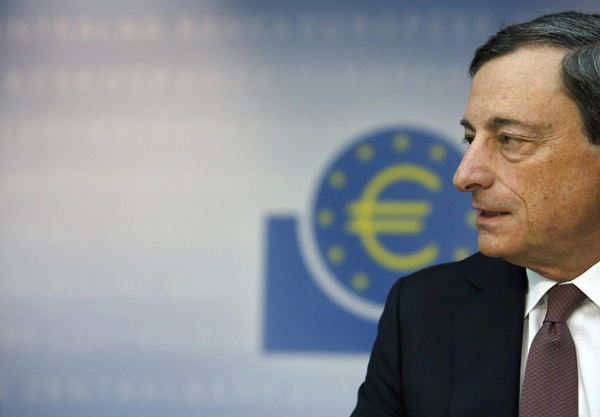Ireland hails historic debt deal with ECB
Updated: 2013-02-08 09:58
(Agencies)
|
|||||||||||
DUBLIN - Ireland clinched a long-awaited deal on Thursday to ease the burden of its bank debts, sending its borrowing costs falling to pre-crisis levels and bolstering its chances of ending its reliance on EU-IMF loans this year.
After nearly 18 months of negotiation, Prime Minister Enda Kenny won European Central Bank (ECB) approval to stretch out the cost of bailing out Anglo Irish Bank, slicing billions off the country's borrowing needs and cutting its budget deficit.
 |
|
European Central Bank (ECB) President Mario Draghi attends the monthly ECB news conference in Frankfurt Feb 7, 2013. [Photo/Agencies] |
"Today's outcome is an historic step on the road to economic recovery," Kenny told a packed parliament in Dublin. "It secures the future financial position of the state."
The assent of the ECB is a major coup for Kenny, who was forced to call an emergency session of parliament last night to liquidate Anglo Irish, a lender whose casino-style attitude to risk helped precipitate the country's financial implosion.
"It certainly is unusual in the history of the crisis that we are actually being surprised in a positive way by the scale of the response," said Austin Hughes, chief economist at KBC Bank. "Normally we have seen underachievement and overpromising.
"The early indications are that this will make a material difference for the outlook on the Irish economy."
The agreement stretches the cost of bailing out Anglo Irish over 40 years rather than ten and cuts Ireland's borrowing needs by 20 billion euros over the next decade.
It also gives the government another 1 billion euros to work with in forthcoming budgets.
Technical talks between the ECB and Irish officials had been bogged down by ECB concerns that any deal given to Dublin to ease the 48 billion euros cost of the Anglo promissory notes could set a precedent for other countries, such as Spain, which are also dealing with large bank debts.
But with European leaders keen to offer a success story from the region's debt crisis to encourage both voters and potential investors, Dublin went back to the drawing board.
Related Stories
ECB defends bond-buying plan amid protests 2012-09-26 15:23
ECB unveils new bond-buying program details 2012-09-07 09:47
ECB cuts benchmark interest rate to record low 2012-07-06 03:26
Today's Top News
Police continue manhunt for 2nd bombing suspect
H7N9 flu transmission studied
8% growth predicted for Q2
Nuke reactor gets foreign contract
First couple on Time's list of most influential
'Green' awareness levels drop in Beijing
Palace Museum spruces up
Trading channels 'need to broaden'
Hot Topics
Lunar probe , China growth forecasts, Emission rules get tougher, China seen through 'colored lens', International board,
Editor's Picks

|

|

|

|

|

|





